
The Posse Comitatus Act is a United States federal law signed on June 18, 1878, by President Rutherford B. Hayes which limits the powers of the federal government in the use of federal military personnel to enforce domestic policies within the United States. Congress passed the Act as an amendment to an army appropriation bill following the end of Reconstruction and updated it in 1956, 1981 and 2021.

Military police (MP) are law enforcement agencies connected with, or part of, the military of a state. In wartime operations, the military police may support the main fighting force with force protection, convoy security, screening, rear reconnaissance, logistic traffic management, counterinsurgency, and detainee handling.

The Australian Federal Police (AFP) is the national and principal federal law enforcement agency of the Australian Government with the unique role of investigating crime and protecting the national security of the Commonwealth of Australia. The AFP is an independent agency of the Attorney-General's Department and is responsible to the Attorney-General and accountable to the Parliament of Australia. As of October 2019 the Commissioner of the Australian Federal Police is Reece Kershaw, formerly the Northern Territory Police Commissioner.

The Bureau of Reclamation, formerly the United States Reclamation Service, is a federal agency under the U.S. Department of the Interior, which oversees water resource management, specifically as it applies to the oversight and operation of the diversion, delivery, and storage projects that it has built throughout the western United States for irrigation, water supply, and attendant hydroelectric power generation. It is currently the U.S.'s largest wholesaler of water, bringing water to more than 31 million people, and providing one in five Western farmers with irrigation water for 10 million acres of farmland, which produce 60% of the nation's vegetables and 25% of its fruits and nuts. The Bureau is also the second largest producer of hydroelectric power in the western U.S.

Law enforcement in India is imperative to keep justice and order in the nation. Indian law is enforced by a number of agencies. Unlike many federal nations, the constitution of India delegates the maintenance of law and order primarily to the states and territories.

Security police usually describes a law enforcement agency which focuses primarily on providing security and law enforcement services to particular areas or specific properties. They may be employed by governmental, public, or private institutions. Security police are generally considered distinct from security guards as security police personnel typically hold some level of law enforcement authority. The exact powers held by security police vary widely between jurisdictions. Examples of these types of agencies include the U.S. FBI Police, the Indian Central Industrial Security Force, and the British Civil Nuclear Constabulary.

Law enforcement in Australia is one of the three major components of the country's justice system, along with courts and corrections. Law enforcement officers are employed by all three levels of government – federal, state/territory, and local.

The Federal Protective Service (FPS) is a federal law enforcement agency of the United States Department of Homeland Security (DHS). It is also "the federal agency charged with protecting and delivering integrated law enforcement and security services to facilities owned or leased by the General Services Administration (GSA)"—over 9,000 buildings—and their occupants.

The Federal Law Enforcement Training Centers (FLETC) serves as an interagency law enforcement training body for 105 United States government federal law enforcement agencies. The stated mission of FLETC is to "...train those who protect our homeland". Through the Rural Policing Institute (RPI) and the Office of State and Local Training, it provides tuition-free and low-cost training to state, local, campus and tribal law enforcement agencies.
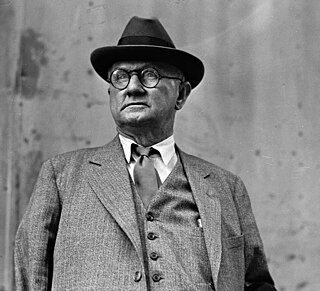
Elwood Mead was an American professor, government official, and engineer known for heading the United States Bureau of Reclamation (USBR) from 1924 until his death in 1936. During his tenure, he oversaw some of the most complex projects the Bureau of Reclamation has undertaken. These included the Hoover, Grand Coulee and Owyhee dams.

A border guard of a country is a national security agency that performs border security. Some of the national border guard agencies also perform coast guard and rescue service duties.
Law enforcement in Pakistan is one of the three main components of the criminal justice system of Pakistan, alongside the judiciary and the prisons. The country has a mix of federal, provincial and territorial police forces with both general and specialised functions, but the senior ranks of all the provincial forces and most of the federal ones are manned by members of the Police Service of Pakistan (PSP). The PSP is one of the most prestigious part of the Central Superior Services, Pakistan's main civil service organisation. Federal law enforcement agencies are generally overseen by the Ministry of Interior of the Government of Pakistan, while provincial police forces are overseen by a department of the government of that province.

In many countries, particularly those with a federal system of government, there may be several law enforcement agencies, police or police-like organizations, each serving different levels of government and enforcing different subsets of the applicable law.

The Maryland Natural Resources Police (NRP) is the law enforcement arm of the Maryland Department of Natural Resources (DNR), tasked with enforcing laws on the state's public lands and waterways, protecting fish and wildlife, and leading search and rescue efforts. The Natural Resources Police is also the state's maritime homeland security agency.
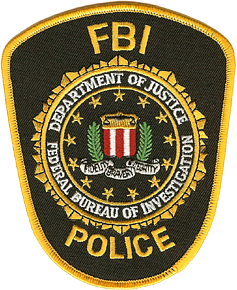
The FBI Police is the uniformed security police of the Federal Bureau of Investigation (FBI) and is part of the Bureau's Security Division. The FBI Police is tasked with protecting key FBI facilities, properties, personnel, users, visitors, information and operations from harm and may enforce certain laws and administrative regulations.
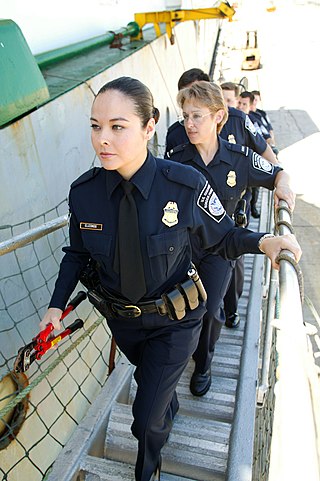
The federal government of the United States empowers a wide range of federal law enforcement agencies to maintain law and public order related to matters affecting the country as a whole.
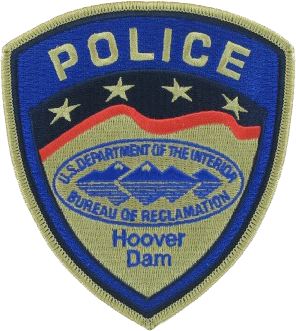
The Hoover Dam Police, officially the Bureau of Reclamation Police, was a federal security police force, stationed at Hoover Dam 23 miles (37 km) southeast of Las Vegas under the command of the US Bureau of Reclamation. Reclamation Police Officers were stationed only at Hoover Dam. Hoover Dam was both listed on the National Register of Historic Places in 1981, and was designated a National Historic Landmark in 1985. Hoover Dam has been designated as National Critical Infrastructure. The primary responsibilities of the Hoover Dam Police Officer were to protect the dam, the world's 57th-largest hydroelectric generating station, which provides about 2,080 megawatts, its associated structures, and to safeguard the lives of visitors and employees. The Hoover Dam Police were assisted by unarmed Bureau of Reclamation Security Guards who control access to reclamation facilities and deter individuals who might consider criminal activities or terrorist acts.

The Department of the Army Civilian Police (DACP) are the civilian federal law enforcement bodies of the Department of the Army of the United States of America. There is no centralized DACP agency, with all civilian law enforcement agencies of the Army falling under the “DACP” title. The DACP are controlled jointly by the Department of the Army and the Department of Defense and as such, they are commonly referred to as DoD Police.
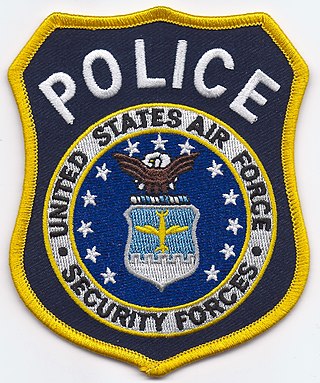
The United States Department of the Air Force Police are the civilian uniformed police service of the United States Department of the Air Force, responsible for the force protection of assets and all aspects of law enforcement on U.S. Air Force and U.S. Space Force installations, and other facilities operated by Air Force and Space Force.

In India, the Central Armed Police Forces (CAPF) is the collective name of central police organisations under the Ministry of Home Affairs of India. These are technically paramilitary forces formerly known as the Central Para-Military Forces. Since 2011, India adopted the term "central armed police forces" to drop the word "paramilitary". These forces are responsible for internal security and guarding the borders.





















